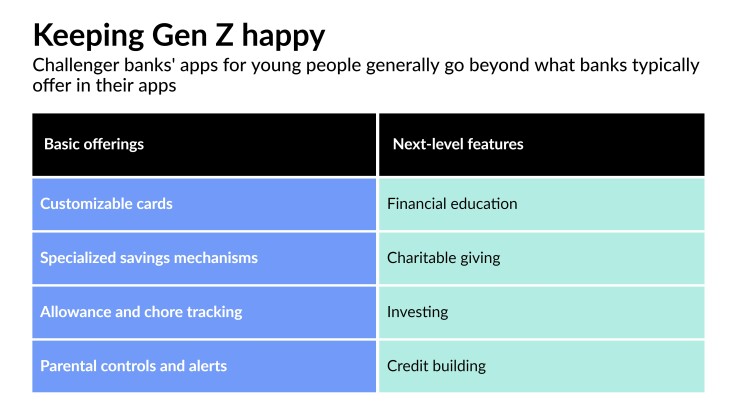Aditi Shekar was inspired to start Zeta, a digital banking and budgeting app for couples, in 2017 when she couldn't find solid advice or tools to navigate the wide gulf in income between her and her husband — she was a product manager at a coding boot camp and he was a PhD student.
Nor was it the only complex financial relationship in her life. She also commingled finances with her mom and brother.
"Money is not a single-player game," said Shekar, a Zeta co-founder and its CEO. "It's not even a two-person game. You have to build for that multiplayer experience."
Initially Zeta offered two apps for couples, one that acted as a digital joint account and another that helped with budgeting. Now there is one Zeta app that is a blend of both. It is broadening its reach to families of all stripes. That will include parents who want to hand off some financial responsibility to their children or their children's caregivers, or unconventional relationship structures between two or more adults who intertwine their finances, such as Shekar with her mom and brother.
Zeta's evolution illustrates one best practice of shared finance: that even if the app or tool sets out to serve one audience, it should be flexible enough to accommodate those with adjacent needs who fall just outside of the target.

The consulting firm Forrester defines shared finance as any situation in which a person acts as an observer of, partner in, or proxy for another person's finances. Beyond traditional joint bank accounts, experimentation in new products and services lies almost squarely with fintechs rather than traditional financial institutions. The concept has become even more relevant during the pandemic, as multigenerational households coalesced, or as personal financial struggles or increases in living costs drove people to depend on others financially. Lately, it's been taking on new forms, from divorced parents to business collaborators who want to finesse the degree of access that other parties get.
Peter Wannemacher, principal analyst at Forrester, wrote a report about shared finance in August 2021. The appetite for such tools has only gone up since then, he says.
"Demand still outstrips supply," he said.
Forrester categorizes shared finance into four categories: families, couples, elders and temporary.
The
The
There are a few fintechs for people helping their elderly relatives manage their finances safely, including True Link Financial and EverSafe. One company, Carefull,
"Temporary" shared finance situations could involve people traveling together or roommates sharing expenses through apps such as Splitwise.
Wannemacher believes that any company engaging in shared finance should be expansive about their definitions, and willing to try something that falls in between or outside of the four categories. His 2021 shared finance report found that most of the fintechs he interviewed reported that adoption of or demand for their products extended beyond their core audience.
"Creativity matters more than segmentation," he said.
Shekar says that Zeta is zooming in on families rather than couples "because they are an interesting, complicated, messy unit of finance that has all kinds of custom needs," she said. Moreover, "we've had instances where roommates want to open an account, or divorced couples."
Zeta introduced personal accounts in beta in December — but users must start with a joint account. This quarter, it is planning to add embedded tax preparation with a third-party provider, which will carry a fee and provide another stream of revenue beyond interchange fees. It is toning down the couple-centric language and incorporating more language around families. Piermont Bank, which is based in New York City and has $448.9 million of assets, provides the underlying banking services.
Although the family challenger bank space is crowded, "We are focused on becoming the primary household account," said Shekar. "We are not trying to be a side account for you to manage an allowance for your child."
Other categories have received short shrift and are slowly seeing traction.
Linda Hamilton, executive vice president at Hitched, says its goal is to help people stay together and grow with them, but "There's always a funny person who suggests Iroquois should also launch 'UnHitched,' " she said.
Nerve's next step is to partner with community banks to serve microbusinesses that are not necessarily creator-specific, such as house-cleaning services. Nerve is in discussions with banks about the possibility, and may white-label its app or let institutions refer their customers to Nerve. But either way, the community bank would hold the deposits and potentially deepen the relationship.
"They could serve their microbusiness customers, pull them out of the retail deposit mix, and be in that loan conversation when that microbusiness is growing," said Waupsh.
It's harder to find shared finance tools at traditional banks.
Wannemacher says he is aware of two of the four major banks in the U.S. that are considering or starting to develop minimum viable products for shared finance initiatives. He has also seen large and midsize banks experiment with the concept, but most of it is surface level.
"There is value in packaging things in a way that is more valuable to families, or divorced parents, or elderly parents and their adult children," said Wannemacher. "But there has been a lot more slapping a coat of marketing on it, rather than there has been real, from-scratch product innovation and design."
That is why he sees ample opportunity for banks to get creative.
"Banks have a big advantage here," said Wannemacher. "These are fraught relationships between people, so banks can be this trusted third party."






